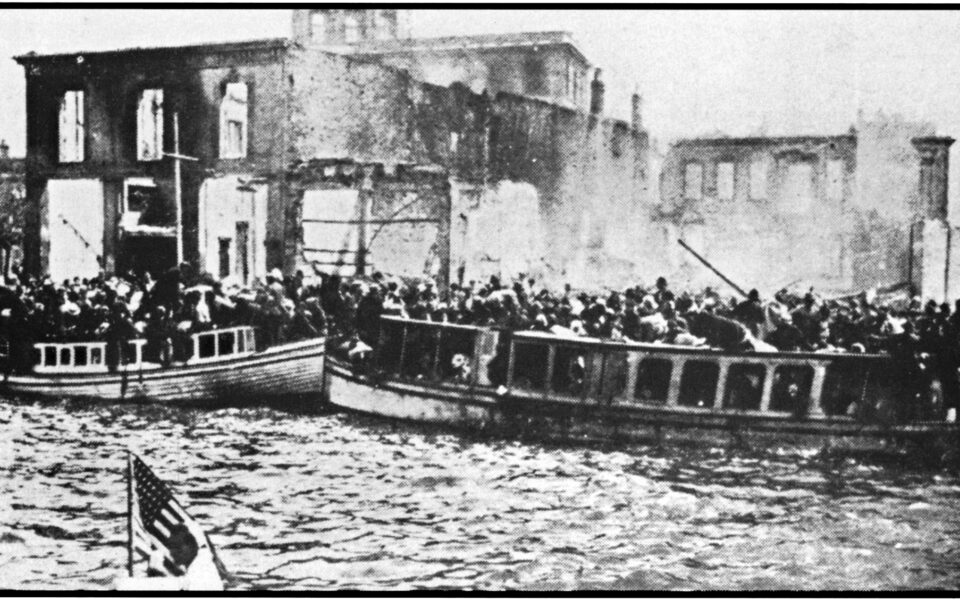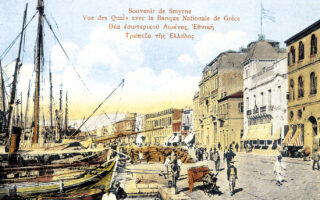Smyrna 1922: The truth still matters

No one would board an airplane piloted by someone who doesn’t believe in truth. We want pilots committed to veracity about things like speed, safety, and whether the plane is flying parallel to the ground. Yet when it comes to history, many people do not believe in truth or doubt that it can ever be known. A case in point is the sacking and burning of Smyrna, Turkey in 1922. Some modern historians (“The Ottoman Endgame” by Sean McMeekin) still argue the origin of the fire is disputable because Turkish sources mostly attribute responsibility to Greeks or Armenians, and vice versa.
But the truth about who torched Smyrna has long been evident to serious observers. One such man was George Horton, the American consul in the city at the time of its destruction. As we recognize the centennial of Smyrna’s demise this month, it is worthwhile recalling Horton and his book, “The Blight of Asia.” The British consul, Harry Lamb, advised Horton against publishing it, telling him in a letter that it was not “expedient” nor “obligatory” to tell “the whole truth” about what happened. Horton disagreed, describing in his book how Kemal’s nationalists burned the city as part of a “Turkey for the Turks” policy, a scheme of genocidal homogenization that a succession of Turkish governments relentlessly pursued.
Recent scholarship substantiates Horton’s account, both about the burning of Smyrna and the Christian genocides in Asia Minor. Recently revealed German archives prove the Turks “decided on the final annihilation of the Armenian people and carried this plan out” (“Evidence from German Archives” compiled and edited by Wolfgang Gust), something that has never really been in doubt. More recently and broadly, scholars scouring national archives from WWI belligerents argue it is “incontrovertible” that Turkish leaders pursued the ethnic cleansing and genocide of all Christians (“The Thirty Year Genocide” by Benny Morris and Dror Ze’evi, and “Massacres, Resistance, Protectors” by David Gaunt). Recent authoritative histories of Smyrna’s destruction detail how Kemal’s soldiers burned the city (e.g. “Paradise Lost” by Giles Milton, “America’s Black Sea Fleet” by Robert Shenk, “The Great Fire” by Lou Ureneck) as part of his plan to “de-Christianize” Asia Minor.
But should we care about something that happened so long ago? Does it matter any longer? Yes, it does. The truth always matters, and not just for pilots, but for historians and society. Without the truth about what happened in the past, it is impossible to understand why it happened, and thus make wise decisions about what to do next. If we do not know why terrible events occurred, preventing their repetition is much more difficult. What happened in Smyrna and Asia Minor is an object lesson on just that point.
Recently revealed German archives prove the Turks ‘decided on the final annihilation of the Armenian people and carried this plan out’
The truth mattered in the 1920s as false information peddled by American and French officials, among others, gave Kemal diplomatic cover and militated against intervention that could have saved innumerable lives. The truth continued to matter for years thereafter. Germany covered up and excused the Ottoman massacres before and during World War I because the Turks were an important ally. After the war, German pastors and others decried the genocides, but they were silenced by other Germans who admired the Turks for fighting back against the harsh post-war treaties, defeating the Allied powers, and wiping out “internal enemies” to produce a homogenous, united Turkish national entity. When the Nazis came to power, they not only admired the Turkish example but emulated it (“Ataturk in the Nazi Imagination” and “Justifying Genocide,” both by Stefan Ihrig). Applying the Turkish model, Hitler disarmed the Jews, used propaganda to stigmatize them as dangerous outsiders, rounded them up, robbed them and confiscated their property, deported them ostensibly to work camps but away from population centers so their true fate could be better hidden, and mass murdered them. After invading Poland, Hitler informed his commanders that his SS Death’s Head Units (Totenkopfverbande) would “kill without pity or mercy all men, women and children of the Polish race or language.” “After all,” he infamously asked, “who remembers the Armenians?” (“The Decline of Eastern Christianity Under Islam” by Bat Ye’or).
Even a hundred years later the truth about the Asia Minor genocides still matters. Today China is replicating the Turkish example, persecuting more than a million Uyghurs in a quest for complete national homogeneity. Countries ignore the ongoing genocide in China to protect their economic interests, just as they ignored the Christian genocides a century earlier. The truth matters for other reasons too. Recep Tayyip Erdogan, Turkey’s current ruler, is emulating Kemal’s authoritarian methods and seeking new territorial conquests. He openly lusts after more Aegean and European land (Euronews). An old adage insists that “if you want more of something, subsidize [i.e. reward] it; if you want less of something, tax [i.e. punish] it.” To George Horton’s horror, the world not only tolerated but rewarded Turkish genocides a century ago and got more of same as a result. If we want fewer crimes against humanity, we must penalize them. The place to start is by telling the truth about what happened 100 years ago in Asia Minor.
Ismini Lamb is director of the Modern Greek Studies Program at Georgetown University. Her biography of George Horton, “The Gentle American,” co-authored with Christopher Lamb, is available from Gorgias Press in hardback, and from Gorgias’ publishing partner, De Gruyter, in an eBook edition.





